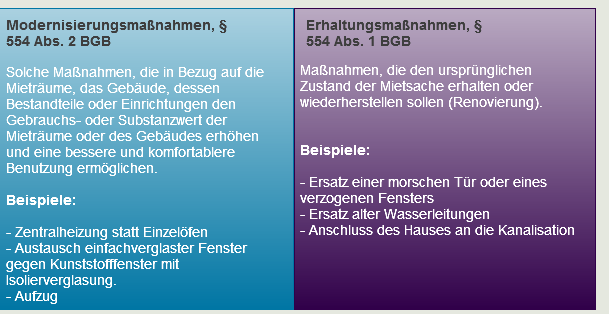Local Court Offenbach, 08/02/2013, Ref.: 37 C 445/12
If the landlord carries out or has work carried out on the rental property, a distinction must be made between so-called modernisation measures and so-called maintenance measures.
Modernisation measures are according to § 555b GERMAN CIVIL CODE structural alterations by the landlord,
- through which final energy is sustainably saved in relation to the rented property (energy modernisation),
- that sustainably save non-renewable primary energy or sustainably protect the climate,
- which sustainably reduces water consumption,
- through which the utility value of the leased property is sustainably increased or
- the general living conditions are improved in the long term.
Conservation measures In turn, these are measures designed to rectify existing damage (repair) or prevent potential damage (maintenance).
The following diagram illustrates the difference between maintenance and modernisation measures:

This distinction is particularly important because a maintenance measure can be announced by the landlord in a much simpler way and in a much shorter time than a modernisation measure.
In the case of modernisation measures, on the other hand, the law provides for much stricter measures with regard to the form and time of notification.
In the above-mentioned decision, the Offenbach Local Court had to decide whether the landlord was entitled to demand a rent increase from the tenant following a modernisation measure, even though the parties to the tenancy agreement had agreed that the rent was to be paid by the tenant in return for the provision of services.
Case Background
The defendants had been renting a flat in Offenbach for several years, initially without a written contract. It was not until 8 June 1986 that they concluded a written tenancy agreement with the then owner of the flat. The contract provided for an indefinite rental period, namely until the death of the last living tenant. The tenancy agreement did not specify the amount of rent, but the tenants undertook to maintain the garden and pay ancillary costs, in particular heating costs. At the end of 2007, ownership of the property was transferred to the plaintiff through a forced sale.
Dispute over rent increase after modernisation
In 2012, the plaintiff carried out thermal insulation of the building, which led to modernisation costs of EUR 7,944.74. The resulting rent increase amounted to EUR 12.95 per month or EUR 155.37 per year. The defendants were informed of this rent increase in a letter dated 30 August 2012. However, the defendants refused to pay the increase and argued that, according to the tenancy agreement, their rent payments were covered by the services provided, such as garden maintenance. They considered rent increases to be inadmissible.
Decision of the Local Court of Offenbach
The Offenbach Local Court ruled in favour of the plaintiff and decided that the defendants were obliged to pay the rent increase. According to the court, this obligation results from Sections 535 (2), 559 and 559b (2) BGB, which regulate modernisation rent increases. The defendants would have had to pay the increased rent of EUR 12.95 per month from November 2012. The court clarified that the landlord can sue directly for payment in cases of modernisation and that the tenants' consent to the rent increase is not required.
Significance of the rental agreement
The court rejected the defendant's argument that the rental agreement excluded any obligation to pay rent. The originally agreed services such as garden maintenance were not regarded as a complete replacement for the payment of rent. The flat was also not a service flat in accordance with Section 576b BGB, which could constitute an exception to rent increases. The contract therefore did not exclude a modernisation rent increase in accordance with Section 559 BGB, meaning that the plaintiff was in the right.
Conclusion
The ruling makes it clear that rent increases following modernisation measures are permissible even if the original tenancy agreement does not provide for rent payments as long as certain services are provided. The agreements in the tenancy agreement may not be interpreted in such a way that they exclude any obligation to pay rent. Furthermore, tenant consent to such increases is not mandatory.
Source: Offenbach Local Court
Important Note: The content of this article has been prepared to the best of our knowledge and belief. However, due to the complexity and constant evolution of the subject matter, we must exclude liability and warranty. Important Notice: The content of this article has been created to the best of our knowledge and understanding. However, due to the complexity and constant changes in the subject matter, we must exclude any liability and warranty.
If you need legal advice, feel free to call us at 0221 – 80187670 or email us at info@mth-partner.de.
Lawyers in Cologne provide advice and representation in tenancy law.

